Subtotal: $3,043.98
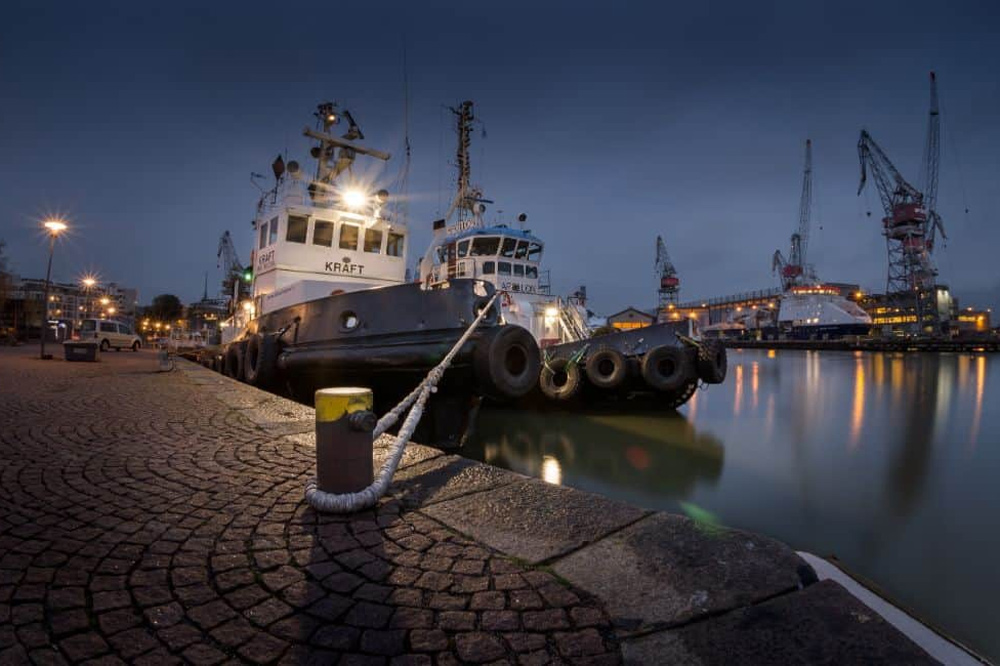
Boat Lights: Which Option Is Right For You?
Boats offer both adventure and relaxation and having boat lights is crucial for safety and creating the right ambience, particularly when navigating through dimly lit nights and murky waters. Having a well-lit boat is not only necessary for safe navigation but also for enhancing the ambience of your vessel. Choosing the perfect boat navigation lights can be a daunting task, given the numerous options in the market. This guide will provide comprehensive information on factors to consider when buying these lights, the different types available, installation, and maintenance tips.
Types of Boat Lights
Boat lights come in a variety of types, each designed to serve a specific purpose. Map reading lights, for instance, are essential for illuminating navigation charts and other important documents, providing a clear view without disturbing the boat’s overall lighting. Searchlights are powerful, high-intensity lights that help in spotting markers and buoys, assisting navigation in poorly lit areas, or locating overboard items or persons.
Bung lights offer a unique solution for illuminating the interior of a boat, especially in areas like storage compartments and under-seats. For unexpected situations, emergency lights and torches form a crucial part of the boat’s safety equipment, allowing for proper visibility during power failures or when signalling for help.
For smaller crafts without power systems, battery-operated lights are the go-to option. These are not only portable but also highly efficient, providing ample illumination without the need for a power source.
One of the trendiest options for boat lighting is strip lights. These flexible, adhesive-backed LED strips can be attached anywhere on the boat, radiating a gentle light that enhances the boat’s aesthetics while ensuring its functionality. Other commonly used lights include:
Navigation Lights
Boaters should check local laws and legislation regarding navigation light requirements. These lights are essential for day and night navigation, typically available in white, green, and red colours. Navigation lights provide crucial information about a boat’s course, speed, location, and size. They serve as guides for other vessels to identify your boat in dark or foggy conditions. Navigation lights are positioned on both the port and starboard sides, as well as the stern, and are available in different sizes to accommodate various boat models.
Port Lights (Red): These are mounted on the left side of the boat. If another vessel sees this light, it indicates that your boat is moving from their right to their left, or starboard to port.
Starboard Lights (Green): Green lights are positioned on the right side of the ship. If visible to another watercraft, it communicates that your ship is moving from its left to its right, or port to starboard.
Stern Lights (White): The white stern light is positioned at the rear of the boat. If this light is visible to another vessel, it indicates that your boat is moving away from them. It is important to note that light alone can’t tell you if it is travelling in a straight line. Understanding these light placements and their meanings is vital for safe and effective navigation in the dark.
Examples of these lights available on Boathut are:
BLA Navigation Lights Port & Starboard Side Mount White Led
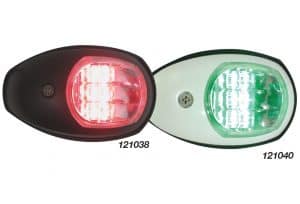
The BLA Navigation Lights are designed with a clean, contoured shape that blends seamlessly with the boat’s aesthetic, offering no edges to catch on ropes or crew members. They boast LED technology promising reliability, energy efficiency, and low heat generation. The clear lens of these lights ensures maximum illumination, while the LED effectively creates a red and green colour, providing precise signalling for other vessels.
Black Rectangle LED Port & Starboard Lights – Pair 12 Volt
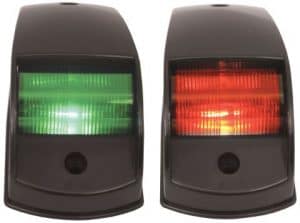
Black Rectangle LED Port & Starboard Lights are the perfect solution for boat owners seeking a more traditional aesthetic without sacrificing function. These lights are equipped with strong LEDs, eliminating the need for frequent bulb changes. Enhanced durability is ensured with a sealing gasket around the base of the lens, protecting it from water intrusion.
Navigation Lights Port & Starboard Compact Side Mount White 12 Volt Led
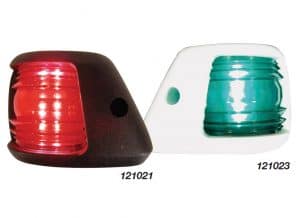
The LED Illumination Navigation Lights offer a productive solution for boaters seeking reliability, energy efficiency, and low heat generation. Equipped with LED technology, these lights provide consistent and clear illumination under all circumstances.
White Rectangle LED Port & Starboard Lights – Pair 12 Volt
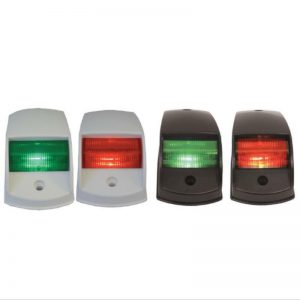
White Rectangle LED Port & Starboard Lights are also a traditional style of navigation lights with long-life LEDs, making them ideal for boats of all sizes. The lens is constructed from high-strength plastic, offering superior protection against water intrusion. These lights are designed to meet any standard and offer exceptional performance.
Underwater Lights
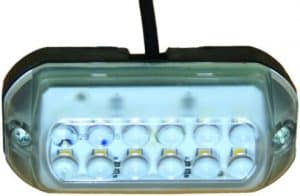
Underwater lights are a fantastic addition to enhance safety and style on your boat. While they are not intended for navigation purposes like headlights, they can create a mesmerising light display in the water, perfect for swimming at night or docking. Our recommended underwater light for these applications is the ED Underwater Lights – 2.4 Watt 12 Volt 180 Lumen White Light. It is an affordable option specifically designed for smaller boats and ideal for surface mount applications.
Deck Lights
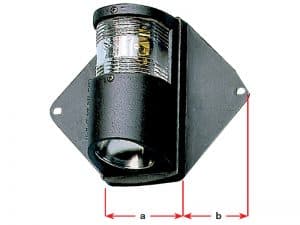
Deck lights make a great addition to any boat, adding a touch of style and enhancing visibility. They are designed to be low-profile and efficient while providing ample illumination without causing glare. Additionally, they come in many shapes and sizes, allowing you to customise the look of your vessel. The best deck light for boats is Steaming Deck Light – Mast Mount 12 Volt, which is made from black polypropylene and a clear acrylic lens and provides 360-degree illumination.
Interior Cabin Lights
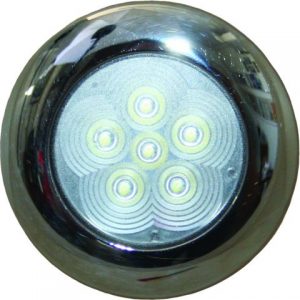
Interior cabin lights are an essential part of interior lighting, providing comfortable and efficient illumination for the interior of your vessel. They are designed to be energy-efficient and long-lasting, with the option of installing them in either standard or dimmable variations. Regarding Interior cabin lights, you can choose LED Interior Light – Flush Stainless Steel 12 / 24 Volt 75 Lumen or LED Interior Light – Slimline Stainless Steel 12 Volt 182 Lumen. Both are great options for providing illumination in the cabin.
Factors to Consider When Buying Lights
Visibility and Brightness
The visibility and brightness of your lights are crucial factors for your safety on the water. According to Coast Guard guidelines, navigation lights should be visible from 2 nautical miles away. This includes sidelights, stern lights, and masthead lights. Additionally, cockpit lights should be bright enough to illuminate the deck without impeding your night vision.
Power Source Options (12 volts 24 volts – battery operated.)
When choosing vessel lights, it’s essential to consider the power source options available. Most lights can operate on either 12 or 24-volt battery systems, making them versatile for different types of boats.
Energy Efficiency and Battery Consumption
When out on a boat, energy consumption should be the least of your worries. High energy consumption means frequent battery charges or replacements. LED lights are energy-efficient and have a longer lifespan before requiring a charge or battery replacement. These lights typically run off the boat’s power supply, using battery models similar to those used in torches.
Durability and Waterproofing Features
Boat maintenance can be demanding. To make it a little easier, ensure your light fixtures are durable enough to withstand exposure to saltwater, harsh weather conditions, and moisture. Look for lights with waterproofing features like an IP rating, which can withstand splashes or immersion in water. Such lights eliminate the need for regular replacements and cut maintenance costs.
Mounting Options and Placement Considerations
Lighting placement and mounting are equally important factors to consider. The placement of navigation lights should adhere to regulations and international standards. For cockpit lights, consider mounting options that complement your boat’s aesthetics and provide sufficient illumination without obstructing your view.
Ease of Installation and Wiring Considerations
Lighting installation should be straightforward and uncomplicated. Consider lighting options that can be easily installed with minimal wiring requirements. Not only does this save on time and labour costs, but it also avoids needing a professional electrician.
Lighting Control Options (On/Off, Dimming, and Remote Control)
Lighting on a boat can offer different brightness and dimming options. Choose lighting fixtures with controls that meet your needs. A remote-controlled light system will enable you to control the lights without physically moving from the captain’s chair.
Aesthetics and Style for Enhancing Boat Appearance
Finally, for many boat enthusiasts, the appearance and style are equally important as the functionality of a fixture. The right lighting choice can transform your boat’s appearance and create the perfect ambience.
Choosing suitable lighting options can add character, style, and a touch of luxury to your boat. Different boat activities require unique lighting solutions. Galley lights, for instance, are crucial for cooking tasks. Bright and direct lights should be considered in this area to ensure safety and convenience while preparing meals. Deck lights, on the other hand, are essential for fishing expeditions. Choosing lights that are bright enough to aid in bait preparation and spotting the catch, yet subtle enough not to scare off the fish is essential.
Cabin lights should also be considered because they offer a pleasant atmosphere for relaxation and reading. Considering adjustable lights that can cater to varying brightness levels depending on the activity or time of day can enhance the overall experience. Consider strategically positioning map reading lights to provide concentrated light for navigation while minimising distraction to the helm.
Spotlights are incredibly useful for search operations or navigating through poorly lit waters. By using a high-intensity, directed beam light, you can significantly enhance visibility over long distances, ensuring your safety. Consider choosing the right functional lighting to greatly enhance your boating experience
Choosing the Right Lights for Your Needs
Matching Boat Type and Usage with Suitable Lights:
Many boat owners tend to choose lighting fixtures that directly replace their existing ones. This approach is often preferred as it ensures that the new lights match up with the existing screw holes, wiring infrastructure, and other features, which simplifies the installation process. However, while this method may seem convenient, it may not always provide the best solution in terms of improved functionality, energy efficiency, or aesthetic enhancement
Setting a Realistic Budget for Buying Lights For Your Boat:
light for your boat comes in a wide range of prices, from budget-friendly options to high-end designs. It’s important to set a realistic budget for your choice of lights, taking into account their intended usage, the quality of materials, and any additional features you may need. While opting for the cheapest option is tempting, remember that you may spend more money on repairs and replacements in the long run. Investing in high-quality lights can save you money and hassle in the long term.
Considering Brand Reputation and Reliability:
When shopping for lights, it’s important to consider the brand reputation and reliability. Look for brands that have a proven track record of producing high-quality, durable products. Research online or speak with other boat owners to understand which brands are most trusted and reliable in the boating community.
Reading Reviews and Seeking Expert Opinions:
Another important factor to consider when choosing the right lights is to read product reviews and seek expert opinions. This can help you narrow the selection and find lights well-suited to your needs. Look for reviews from other boat owners or professionals in the boating industry. You can also seek the advice of a marine electrician or lighting specialist to ensure that you choose the right lights that meet your specific needs.
Seeking Recommendations from Other Boat Owners:
Finally, consider seeking recommendations from other boat owners who have similar boating requirements. They can provide valuable insights into their own experiences with lighting a boat and recommend lights that they found effective and reliable. Joining online boating forums or attending boat shows can help you connect with other boaters and get their recommendations.
Installation and Maintenance
DIY vs. Professional Installation Pros and Cons
When it comes to installing lights on your boat, you have the option to DIY or hire a professional. DIY installation can be cost-effective, but it requires a certain level of expertise and safety precautions. On the other hand, professional installation may cost more, but it ensures reliable and safe installation. It’s important to weigh the pros and cons of each option and choose the one that suits your level of comfort and expertise.
Proper Placement and Angles for Maximum Effectiveness
One of the most critical factors in installing lights on a boat is placing them in the right position and angle. Navigation lights should always be visible and placed in locations that won’t obstruct the captain’s view.
Wiring and Electrical Considerations for Safe Installation
Proper wiring and electrical considerations are essential for safely installing lights on a boat. Make sure to use marine-grade wiring and connectors to prevent corrosion and damage from exposure to water. It’s also important to follow standard wiring practices, such as using the appropriate gauge wire and securing it properly.
Cleaning and Maintenance Tips to Prolong Lifespan
Keeping your lights clean and maintained can extend their lifespan and ensure their effectiveness. For interior lights on a boat, wipe them down regularly with a damp cloth and avoid using harsh chemicals that can damage the finish. If you take your boat out of the water, underwater lights should be cleaned periodically with mild soap and rinsed thoroughly to remove salt and debris. Navigation lights should be inspected, tested, and kept clean and wiped down before each use to ensure they function correctly.
Conclusion
Whether you find yourself on a moonlit night sail, engaged in deep-sea fishing under the starry sky, or simply savouring the tranquil beauty of the sea, boat lights play a significant role in ensuring your safety and enhancing the allure of your vessel. We trust that this guide has provided valuable insights into these illuminating companions, empowering you to make well-informed choices when choosing the right lights for your boat. For a comprehensive look at our extensive selection of boat lights, please explore our entire range. Should you seek specific lighting solutions not currently featured on our website, please don’t hesitate to reach out to us. We’re here to illuminate your boating experience with the perfect lighting solutions tailored to your needs.
FAQs
How long do boat lights typically last?
The lifespan of boat lights depends on the type of light and quality of materials. Generally, LED lights have a longer lifespan than traditional lights and may last up to 50,000 hours with proper maintenance. Halogen lights typically last between 1,000-2,000 hours.
Can I use regular lights on my boat?
Using regular lights, such as house lights running on 240AC, is not recommended for boats. Marine-grade lights, designed to operate on 12 volts, are specifically built to withstand exposure to water, salt, and other elements in the marine environment. Regular lights may rust and become damaged more quickly when exposed to these conditions
Are LED boat lights worth the investment?
LED lights are generally more expensive than traditional ones but offer several benefits. LED lights are usually brighter, safer to use, and have a much longer lifespan than traditional lighting options. The long-term cost savings of investing in LED lighting makes them a worthwhile choice for many boaters.
What are the legal requirements for boat lights at night?
In Australia, boat lighting requirements at night are governed by the Marine Safety Regulations 2016, overseen by the Australian Maritime Safety Authority (AMSA). Key requirements include displaying navigation lights, stern lights, masthead lights, and more, depending on the type and size of your vessel.
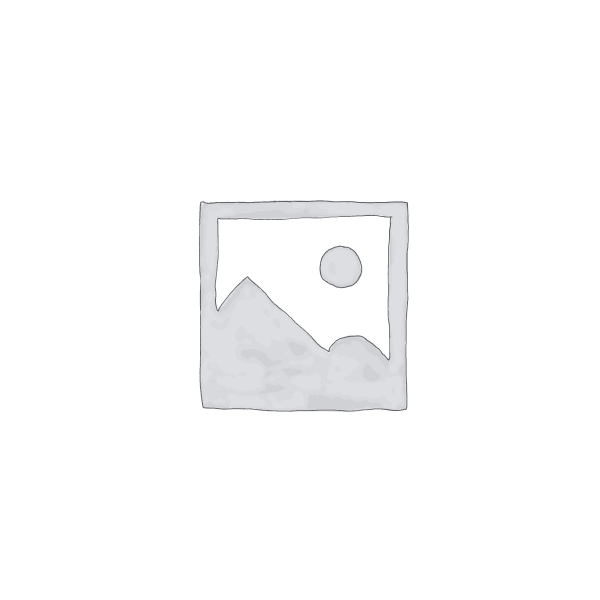 Cutless Bearing Epic 4 1/2"X5 1/2" X18" Bs
Cutless Bearing Epic 4 1/2"X5 1/2" X18" Bs 



